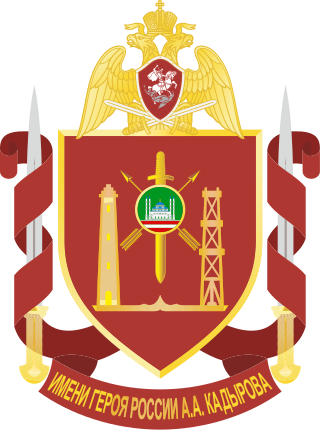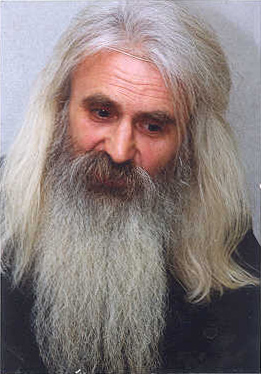Related Research Articles

The Second Chechen War took place in Chechnya and the border regions of the North Caucasus between the Russian Federation and the Chechen Republic of Ichkeria, from August 1999 to April 2009.

The 141st Special Motorized Regiment, also known as the Kadyrovites, Kadyrovtsy and the Akhmat special forces unit, is a paramilitary organization in Chechnya, Russia, that serves as the protection of the Head of the Chechen Republic. The term Kadyrovtsy is commonly used in Chechnya to refer to any armed, ethnically-Chechen men under the control of Head of the Chechen Republic Ramzan Kadyrov, although nominally they are under the umbrella of the National Guard of Russia. As of 2023, the regiment's official commander was Adam Delimkhanov, a close ally of Kadyrov.

In Chechnya, mass graves containing hundreds of corpses have been uncovered since the beginning of the Chechen wars in 1994. As of June 2008, there were 57 registered locations of mass graves in Chechnya. According to Amnesty International, thousands may be buried in unmarked graves including up to 5,000 civilians who disappeared since the beginning of the Second Chechen War in 1999. In 2008, the largest mass grave found to date was uncovered in Grozny, containing some 800 bodies from the First Chechen War in 1995. Russia's general policy to the Chechen mass graves is to not exhume them.
Human rights violations were committed by the warring sides during the second war in Chechnya. Both Russian officials and Chechen rebels have been regularly and repeatedly accused of committing war crimes including kidnapping, torture, murder, hostage taking, looting, rape, decapitation, and assorted other breaches of the law of war. International and humanitarian organizations, including the Council of Europe and Amnesty International, have criticized both sides of the conflict for blatant and sustained violations of international humanitarian law.
Russia incurred much international criticism for its conduct during the Second Chechen War, which started in 1999. The governments of the United States and other countries condemned deaths and expulsions among civilians. The United Nations Commission on Human Rights (UNHCR) passed two resolutions in 2000 and 2001 condemning human rights violations in Chechnya and requiring Russia to set up an independent national commission of inquiry to investigate the matter. However, a third resolution on these lines failed in 2004. The Council of Europe in multiple resolutions and statements between 2003 and 2007 called on Russia to cease human rights violations. The European Court of Human Rights (ECHR) between 2005 and 2007 conducted legal cases brought by Chechens against the Russian government, and in many of these cases held Russia responsible for deaths, disappearances and torture.
The Battle of Grozny of August 1996, also known as Operation Jihad or Operation Zero Option, when Chechen fighters regained and then kept control of Chechnya's capital Grozny in a surprise raid. The Russian Federation had conquered the city in a previous battle for Grozny that ended in February 1995 and subsequently posted a large garrison of federal and republican Ministry of the Interior (MVD) troops in the city.
The Novye Aldi massacre was the mass murder of Chechen civilians in which Russian forces went on a cleansing operation (zachistka) summarily executing dozens of civilians. The village had been cluster-bombed a day prior to the massacre, and local residents urged to come out for inspection the next day. Upon entering the village, Russian forces shot their victims in cold blood, with automatic fire at close range. The killings were accompanied by looting, rape, arson and robbery. As a result of the deadly rampage by Russian forces, up to 82 civilians were killed in the spree. Houses of civilians were burnt in an attempt to destroy evidence of summary executions and other crimes. Looting took place on a large scale and organised manner.
The Alkhan-Yurt massacre was the December 1999 incident in the village of Alkhan-Yurt near the Chechen capital Grozny involving Russian troops under command of General Vladimir Shamanov. The villagers claimed that approximately 41 civilians were killed in the spree, while human rights groups confirmed and documented 17 incidents of murder and three incidents of rape.
The Tsotsin-Yurt operation was a zachistka-type operation by Russian Spetsnaz forces in Tsotsin-Yurt, Chechnya, from December 30, 2001 to January 3, 2002, during the Second Chechen War. The four-day sweep of Tsotsin-Yurt erupted into armed clashes with Chechen separatists, ending in a stalemate with disputed casualty figures. Russian forces were accused of widespread human rights violations, including pillaging, ethnic cleansing and forced disappearances.
The Battle of Komsomolskoye took place in March 2000 between Russian federal forces and Chechen separatists in the Chechen village of Komsomolskoye (Saadi-Kotar), Chechnya. It was the largest Russian victory during the Second Chechen War. Several hundred Chechen rebel fighters and more than 50 Russian servicemen were killed in the course of more than two weeks of siege warfare. An unknown number of civilians were killed in the fighting as well. The fighting resulted in the destruction of most of the forces of Chechen rebel field commander Ruslan Gelayev. Scores of Chechens were taken prisoner by the Russians, and only a few survived. A number of civilians died from torture, and the village was looted and destroyed.
The Komsomolskoye massacre occurred following the Battle of Komsomolskoye during the Second Chechen War in March 2000. A prominent feature in the incident was the fate of a group of about 72 Chechen combatants who had surrendered on 20 March on a Russian public promise of amnesty, but had almost all either died or "disappeared" shortly after they were detained.
Zura Bitiyeva was a locally well-known Chechen human rights activist who was extrajudicially executed by what is assumed to be a Russian government death squad in 2003 after she complained to the European Court of Human Rights of ill treatment during an earlier illegal detention. Three other members of her immediate family were also killed in the same attack.
The Samashki massacre was the mass murder of Chechen civilians by Russian Forces during the First Chechen War. Hundreds of Chechen civilians died as result of a Russian cleansing operation and the bombardment of the village. Most of the victims were shot in cold blood at close range or killed by grenades thrown into basements where they were hiding. Others were burned alive or were shot while trying to escape their burning houses. Much of the village was destroyed and the local school blown up by Russian forces as they withdrew. The incident attracted wide attention in Russia and abroad.

Viktor Alekseyevich Popkov was a Russian dissident, Christian, humanitarian, human rights activist and journalist.
Zachistka is an unofficial Russian military term for "building (room-to-room) clearing operations" featuring armed patrols and house-to-house searches. The term is mostly associated with, but not exclusive to, the Second Chechen War as a result of Russian operations in Chechnya. Several zachistka operations became notorious for their accused or confirmed human rights violations by Russian forces, including ethnic cleansing and pillaging, and the term zachistka is used in English exclusively to refer to these violations, particularly in Chechnya and the Russian invasion of Ukraine.
Chernokozovo detention center is a prison in the village of Chernokozovo, Chechnya, Russia. The detention center is operated by the Ministry of Internal Affairs and currently has the status of penal colony.

Anti-gay purges in Chechnya, a part of the Russian Federation, have included forced disappearances, secret abductions, imprisonment, torture and extrajudicial killing by authorities targeting persons based on their perceived sexual orientation, primarily gay men. At least 2 of the 100 people, whom authorities detained on suspicion of being gay or bisexual, have reportedly died after being held in what human rights groups and eyewitnesses have called concentration camps.

Oyub Salmanovich Titiev is a Russian human rights activist and the head of Memorial's Grozny, Chechnya office. In 2018 he was arrested on politically motivated charges, sparking an international campaign by human rights groups calling for his release. On October 8, 2018, Titiev was awarded the Václav Havel Human Rights Prize, which honours "outstanding" defence of human rights in Europe and beyond.
References
- ↑ "Russian forces seal off Grozny". The Guardian. 18 February 2000.
- 1 2 3 4 Filtration System Archived 2012-03-14 at the Wayback Machine , Memorial, 2008/09/04
- 1 2 Inside the 'Hell' of Chernokozovo, HRW, 26 October 2000 (The Moscow Times)
- ↑ Kortava, David (October 3, 2022). "Inside Russia's 'Filtration Camps' in Eastern Ukraine". Pulitzer Center.
- ↑ Real scale of atrocities in Chechnya: New evidence of cover-up, Amnesty International, 24 March 2000[ dead link ]
- ↑ Widespread Torture in the Chechen Republic: Lack of Accountability, HRW, November 13, 2006
- ↑ Russian 'torture cell' found in Grozny cellar Archived 2007-09-30 at the Wayback Machine , The Independent, 9 June 2006